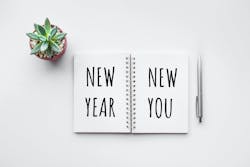Doing Enough, Financial Wellness and Boosting Your Energy: What We’re Reading This Week
Ahh, it’s the start of a new year. If only those pesky old problems from 2023 would go away, too. Well, I can kind of forget about them because there’s no room for them in my fresh new planner.
The ritual of opening a new planner is one of those simple joys in life, at least for me. I can list my aspirations, goals and pledge to make this the most organized and productive year yet. I usually fall short, but I have noticed improvement from, say, five years ago.
If you’ve read this column for a while, you know I’m always looking for new ways to be more efficient and fresh perspectives to help me be more grateful. The beginning of a new year is a great time for all of those things, so this week’s roundup is a look at different ways to recalibrate.
One of my resolutions for 2024 is to be kinder to myself. That means offering myself forgiveness and grace when I don’t meet my own impossible targets, not chastising myself for making honest mistakes and not telling myself I’m not good enough. It’s probably one of my most ambitious resolutions, because that voice in my head always knows what to say to make me feel terrible.
Other people have told me similar things, about how you’re your own worst critic. So maybe, just maybe, the key to being more satisfied, more hygge, with life is to change the voice inside your own head. Here are three stories that changed the way I perceive things and have silenced, or at least softened, my own critiques.
I hope you find them helpful, too. Until next time, stay safe and be well!
You’re Already Doing Enough
Stop and read that previous line again because very few people tell us that—and it’s a really dangerous fallacy to believe. “It’s easy to criticize yourself for not getting enough done, but that can just make things worse,” writes Rachel Goldsmith Turow, psychotherapist in private practice, research scientist and adjunct professor. “People who engage in self-criticism tend to be more depressed, which in turn tends to go along with lower productivity.”
I want to print out and highlight almost every line of Goldsmith Turow’s article, it’s that good. 2023 was a big year for me, and it got overwhelming at times. I was trudging along in the trenches for months, and it felt like I was not getting anywhere, a feeling that I suspect some of you can relate to. A few days ago, I was talking with a co-worker, and she repeated back to me some of the things that happened last year, and I paused and said to myself, “Wow! That’s a lot!”
It's ironic but not unusual that we live our lives but can’t always see what’s happening in them. That’s why Goldsmith Turow’s article resonated with me. She offers five techniques to help you live in the moment and take stock of what’s happening around you. I’m going to practice at least one technique per week—I may even go so far as to schedule it in my planner—because I think her advice could have the potential to change my whole outlook.
I hope you agree and decide to print out and underline, highlight and mark up Goldsmith Turow’s article on your wall.
Read the full article here.
Money Isn’t Financial Well-being
I’ve been talking to a few friends about money lately. How we want to curb spending. How we want to pay off debt or loans. How we want to budget for big expenses, such as a new roof or a vacation. Those are good goals, but they don’t really challenge the way I think about money.
EHS Today has written about financial well-being and how some companies offer financial counseling and other services to help workers alleviate their stressors about money. I think those are great tools because I don’t recall being taught about finances in primary school, or even at college.
I had a bit of an epiphany when I read this from Jeanne Sahadi: “[M]ake just one financial new year’s resolution for 2024: Figure out what financial well-being means for you. It will be a highly personal endeavor. Then pick one or two steps to improve it.”
We definitely need money and to be smart enough with it to keep a roof over our head, the heat on and food in our bellies. But Sahadi gets to the core of what money can offer, such as ease and time, and what it can’t, such as joy. Money is dollars and cents, but it gets intermingled with powerful emotions.
Instead of focusing on how I should or shouldn’t spend money, such as I resolve to not buy a $6 latte every day and make it at home, I want to take a deep dive into my relationship with money and how it can support or detract from my values.
I think I’m going to revisit my budget. Instead of talking about what I need or how much I should allocate for discretionary spending, I’m going to ask myself how this purchase serves me and whether it supports my overall well-being.
Read the full article here.
Boost Your Energy
Forget improving your energy for a few hours with a drink from the convenience storer. The New York Times has a series of articles out this week about boosting your energy for the whole year. The newspaper takes a whole-body approach, from nourishing meals to friendships.
What I like about this series is that touches on things we know, but it still offers some new insights. For example, we know that we need a good night’s rest, but that isn’t always easy or enough for some people. But 5 minutes? We can probably squeeze that into our day. They advise to find a calming spot or do something that you enjoy, such as a leisurely walk or a coffee run. The chosen activity doesn’t matter a whole lot. What does matter is that focus on your breathing and that you choose to do something that (figuratively or literally) fills your cup.
I think the genius behind this series is that lofty ideals are broken down into bite-sized chunks that offer benefits without being burdensome. When that happens, we actually have a chance at accomplishing those goals. The payoff is that we do enough to reap the benefits, and that might spur us onto making more.
Those small changes, such as noticing that we feel sluggish a couple hours after eating, might prompt us to swap that donut for some nuts and fruit. If we understand why we’re making changes—and actively choose them rather than, say, following a low-carb diet—we won’t feel deprived. That’s because we’re doing something good for our future selves. And yes, there can be a time and a place to enjoy donuts, but if we’re more mindful about when we eat them, we might also savor and appreciate them more.
Read the series here.
About the Author
Nicole Stempak
Nicole Stempak is managing editor of EHS Today and conference content manager of the Safety Leadership Conference.

